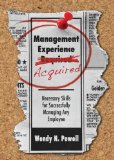Leadership Inspirations – Limitations

Richard Bach
American writer known for his bestseller, Jonathan Livingston Seagull

Richard Bach
American writer known for his bestseller, Jonathan Livingston Seagull

Special Edition 48 – An Interview with Wendy Powell, author of Management Experience Acquired explores the techniques managers need to know in order to effectively deal with the diverse employee issues that occur in today’s workplace environment. During our discussion, Wendy Powell, author of Management Experience Acquired: Necessary Skills for Successfully Managing Any Employee, shares with us her insights and illustrative examples regarding:

Additional Information
In addition to the incredible insights Wendy shares in Management Experience Acquired and this special edition podcast are the resources accessible from her website, www.ManagementExperienceAcquired.com. Wendy’s book, Management Experience Acquired
, can be purchased by clicking here
.
Look for Wendy on NBC’s Daytime
Wendy will be a featured guest on NBC’s Daytime Morning Show the week of Monday, October 11. Watch for Wendy and learn more about how to become increasingly effective even in a down economy.
Final Request…
The strength of our community grows with the additional insights brought by our expanding member base. Please consider rating us on iTunes by clicking here. Rating the StrategyDriven Podcast and providing your comments online improves our ranking and helps us attract new listeners which, in turn, helps us grow our community.
Thank you again for listening to the StrategyDriven Podcast!
About the Author

. With more than twenty-five years of human resource and management consulting experience, Wendy has spent most of her career at the University of Michigan. She is currently on the business faculty at both Palm Beach State College and the University of Phoenix. A member of the Society of Human Resource Management, she received a leadership award in 2002 from the Midwest College and University Professional Association for Human Resources. She is routinely featured on The Huffington Post and has appeared on Fox Business’s The Strategy Room. Wendy holds a Bachelor of Science degree in business management and a Master of Arts degree in organizational management.
Podcast: Play in new window | Download (Duration: 30:13 — 41.5MB)
Subscribe: RSS

The strength of our community grows with the additional insights brought by our expanding member base. With your support, our community of listeners and readers has grown tremendously in the past several months. Please help us continue to grow by recommending the StrategyDriven Podcast to family, friends, and colleagues who you believe will benefit from listening.
Additionally, please consider voting for us monthly on Podcast Alley by clicking here. Casting your vote for the StrategyDriven Podcast improves our monthly ranking and helps us attract new listeners which, in turn, grows our community.
Thank you again for listening to and voting for the StrategyDriven Podcast !

Hi there! Gain access to this article with a StrategyDriven Insights Library – Total Access subscription or buy access to the article itself.
| Subscribe to the StrategyDriven Insights Library
Sign-up now for your StrategyDriven Insights Library – Total Access subscription for as low as $15 / month (paid annually). Not sure? Click here to learn more. |
Buy the Article
Don’t need a subscription? Buy access to Resource Management Best Practice 5 – Staggering Project Starts for just $2! |

The ‘too big to fail’ philosophy found a home in the Dodd-Frank Wall Street Reform and Consumer Protection Act. This act provides the Federal Deposit Insurance Corporation (FDIC) with the power to seize and break up ‘too big to fail’ companies if it believes they are headed toward financial collapse.1 The FDIC’s authority covers non-financial corporations with at least $50 billion in assets as well as financial institutions. While this may sound like a reasonable solution to the ‘too big to fail’ problem, it only serves to make matters worse.
“One of the highest priorities is identifying the universe of non-bank financial companies that – because of their leverage; off-balance sheet exposures; nature, scope, size, scale, concentration, interconnectedness, and mix of activities; or other factors identified in the Dodd-Frank Act – should be subject to enhanced prudential supervision by the FRB.” 2
Sheila C. Bair
Chairman, Federal Deposit Insurance Corporation
on Systemically Important Institutions and the Issue of “Too Big to Fail” before the Financial Crisis Inquiry Commission
September 2, 2010
The ‘too big to fail’ provisions of the Dodd-Frank Wall Street Reform and Consumer Protection Act will not prevent companies systemically linked to the health of the U.S. economy from collapsing and in several ways promotes conditions that will exacerbate the next financial downturn. Consider:
While the Dodd-Frank Wall Street Reform and Consumer Protection Act seeks to minimize the impact of the collapse of a ‘too big to fail’ company on the U.S. economy, it’s mechanism of corporate dismantlement and risk removal leaves the door open to even more impactful collapses in the future. As such, the solution provided addresses only half the issue. What the act missed is the prevention of a systemically linked company’s collapse to being with or, dare we suggest, the elimination of ‘too big to fail’ companies all together in a non-crisis setting.
StrategyDriven Recommended Practices
The significant marketplace uncertainty created by the Dodd-Frank Act will not likely be resolved soon; necessitating that company leaders act to mitigate, transfer, or eliminate these risks facing their organizations. In this specific case, StrategyDriven suggests company leaders consider the following:
Final Thought…
The somewhat ill-conceived ‘too big to fail’ provisions of the Dodd-Frank Act serve as a lesson in problem resolution. As noted earlier, the Dodd-Frank Act does nothing to mitigate, transfer, or alleviate the problem of ‘too big to fail’ companies actually succumbing to financial collapse thereby doing nothing to prevent the initiating event of the Financial Crisis of 2008. Additionally, provisions of the act create circumstances that may make it more likely for a financial collapse to occur in the future, one with even greater impact. Remember that to effectively resolve any issue it is important to first define the problem and its causes and then to define and select a solution set that fully addresses the defined problem and its causes. Additional information on sound decision-making practices can be found in StrategyDriven’s Decision-Making topic area.
In an upcoming edition of the StrategyDriven Editorial Perspective, we’ll look at the potential impacts of the provisions of the Dodd-Frank Wall Street Reform and Consumer Protection Act that could present a proportionately larger burden on small companies.
As always, we’ll provide our thoughts on how business leaders can best prepare for the implementation of the financial reform law and weather the storm in the long-term. We also hope you’ll share your thoughts, lessons learned, and recommended resources with us and the StrategyDriven audience.
Final Request…
The strength in our community grows with the additional insights brought by our expanding member base. Please consider rating us and sharing your perspectives regarding the StrategyDriven Editorial Perspective podcast on iTunes by clicking here. Sharing your thoughts improves our ranking and helps us attract new listeners which, in turn, helps us grow our community.
Thank you again for listening to the StrategyDriven Editorial Perspective podcast!
Sources
Podcast: Play in new window | Download (Duration: 8:59 — 12.4MB)
Subscribe: RSS
